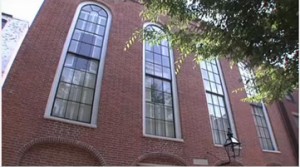The Black Heritage Trail is a walking tour that explores the history of Boston’s 19th century African American community.
Guided walking tours are offered by the National Park Service daily, Memorial Day weekend through Labor Day weekend, and other times by special request. A self-guided walking tour map and guide is also available. For more information on the tour, please contact the museum at afroammuseum.org
The first Africans arrived in Boston in February of 1638, eight years after the city was founded. They were brought as slaves, purchased in Providence Isle, a Puritan colony off the coast of Central America. By 1705, there were over 400 slaves in Boston and the beginnings of a free black community in the North End.
The American Revolution was a turning point in the status of Africans in Massachusetts. At the end of the conflict, there were more free black people than slaves. When the first federal census was enumerated in 1790, Massachusetts was the only state in the Union to record no slaves.
The all-free black community in Boston was concerned with finding decent housing, establishing independent supportive institutions, educating their children, and ending slavery in the rest of the nation. All of these concerns were played out in this Beacon Hill neighborhood.

